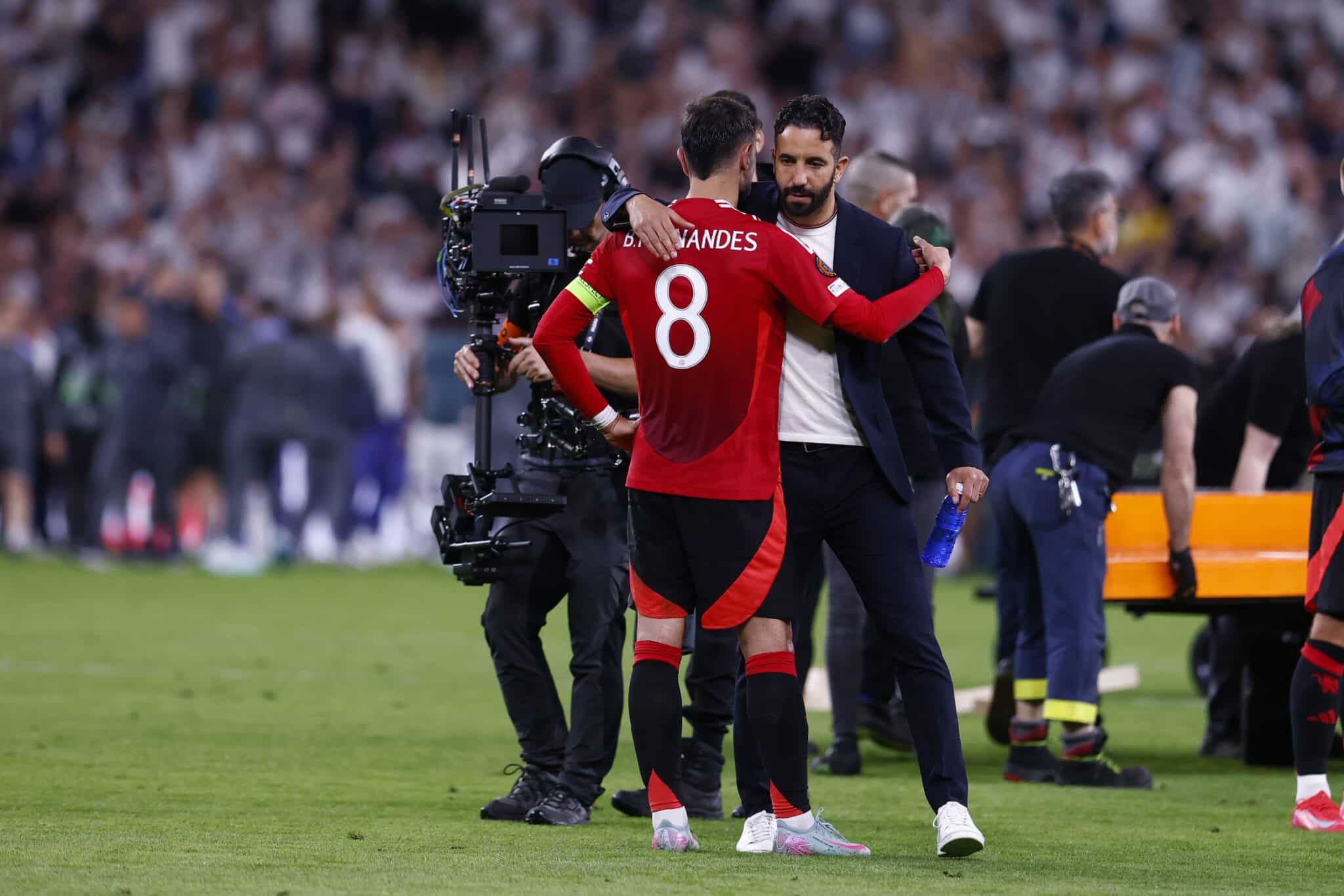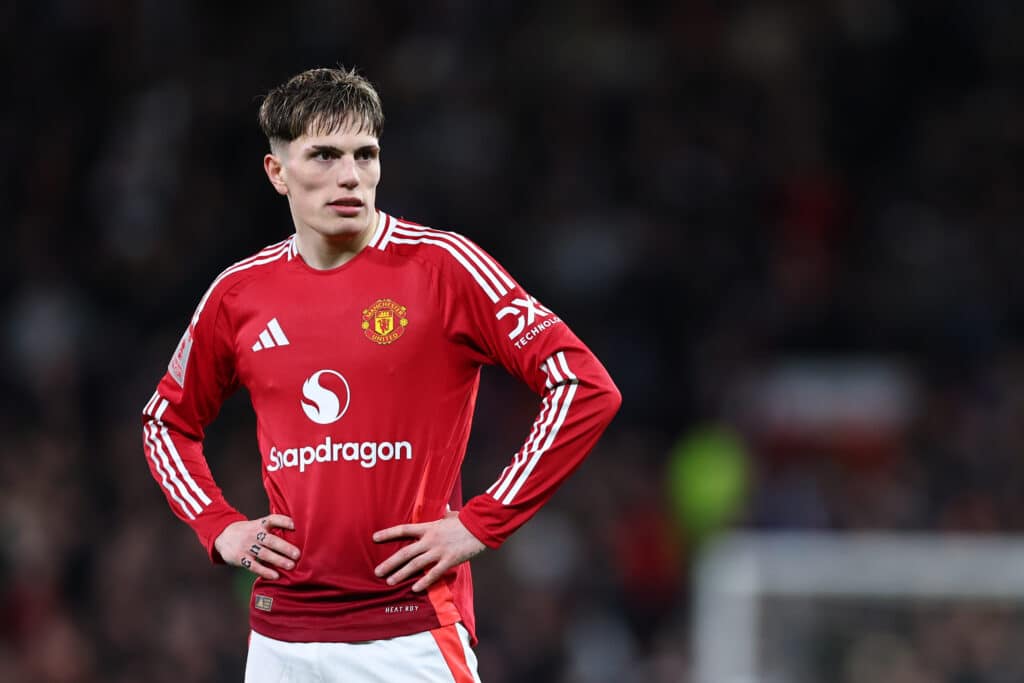> Alejandro GarnachoAndre OnanaSoccerEuropa League
> Alejandro GarnachoAndre OnanaSoccerEuropa League

The San Mames Stadium in Bilbao was supposed to be the stage where Manchester United salvaged a season teetering on the edge of disaster. Instead, it became the scene of a gut-punch defeat, a 1-0 loss to Tottenham Hotspur in the Europa League final on May 21, 2025. Brennan Johnson’s scrappy first-half goal ended United’s hopes of silverware and plunged the club into a sobering reality: no European football next season, a financial hit of around £85 million, and a fanbase caught between frustration and faint hope.
For a club with United’s storied history, this feels like rock bottom. But is it? Or is this the jolt needed to spark a rebuild under Ruben Amorim? Let’s dive into what’s next for the Red Devils as they navigate a pivotal summer.
Manchester United’s 2024-25 campaign has been a rollercoaster with more dips than thrills. Mired near the bottom of the Premier League, the Red Devils have racked up a staggering 20 defeats across all competitions, the most since their relegation season of 1973-74. The Europa League final was their last shot at redemption, a chance to secure a trophy and a Champions League spot. Instead, Tottenham, led by Ange Postecoglou’s gritty resolve, outhustled United in a match that was less a classic and more a slog. Opta stats reveal United managed just 433 successful passes, while Tottenham scraped by with a record-low 112 in a European final. It was scrappy, disjointed, and emblematic of United’s season: effort without execution.
Ruben Amorim, the young Portuguese manager who arrived mid-season from Sporting, stuck to his 3-4-2-1 formation, but it looked clunky against Spurs’ defensive resolve. Luke Shaw’s late header, saved by Guglielmo Vicario, was as close as United came to forcing extra time. Post-match, the mood was grim. Bruno Fernandes, crestfallen, hinted at a potential exit, while Amorim faced questions about his future. Yet, amid the gloom, there’s a sense that this defeat could be the catalyst for change. United’s hierarchy, backed by minority owner Sir Jim Ratcliffe, insists Amorim is their man. So, what’s the plan to turn this ship around?
Since Sir Alex Ferguson left the club at its peak in 2013, Manchester United have struggled to rediscover their identity. While a few trophies have been won along the way, the past decade has largely been defined by inconsistency, disappointment, and missed expectations.
— 365Scores (@365Scores) May 22, 2025
?… pic.twitter.com/Cy6tvIFs1O
Ruben Amorim’s appointment was a gamble, a mid-season leap from the safety of Sporting’s success to the pressure cooker of Old Trafford. His 3-4-2-1 system, built on high pressing and wing-back dynamism, transformed Sporting into Portuguese champions, but it’s been a tough fit for United’s squad. In Bilbao, the formation looked rigid, with three center-halves static against a Tottenham side content to sit deep.
Sky Sports noted Amorim’s reluctance to adjust, even as United lacked attacking spark. Critics, like Jamie O’Hara, didn’t hold back, slamming the manager’s stubbornness. Yet, voices like Rio Ferdinand argue Amorim needs time, a full pre-season, and a transfer window to mold the squad to his vision.
The absence of Champions League football next season is a double-edged sword. On one hand, it’s a financial blow, with experts estimating a £100 million hit to transfer budgets. On the other, it frees up Amorim’s schedule to drill his tactics on the training ground.
Gareth Bale, commentating for TNT Sports, suggested this could be a blessing in disguise, giving United a chance to reset without the distraction of midweek European trips. Amorim himself echoed this, emphasizing the need to “pay attention to our academy and prepare for the future.” The question is whether United’s hierarchy and fans have the patience for a long-term rebuild when instant results are the club’s historical currency.
United’s transfer strategy this summer is already under scrutiny, with the Europa League defeat slashing funds. Rio Ferdinand warned that transfer plans may need to be “scrapped,” but the Manchester Evening News reports United are targeting Wolves’ Matheus Cunha and Ipswich’s Liam Delap, with Cunha’s £62.5 million release clause a potential bargain. Both players fit Amorim’s profile: versatile, high-energy forwards who can press and link play. However, the lack of European football could deter top targets, forcing United to get creative.
Man Utd have made Matheus Cunha their number 1 target to replace Rasmus Hojlund!
— 365Scores (@365Scores) April 23, 2025
The Red Devils are willing to listen to offers for the Danish striker for around £30M. pic.twitter.com/4ZC7sCpJLB
The rumor mill is buzzing about departures. Bruno Fernandes, the team’s heartbeat, admitted post-final that United might need to sell him, a statement that sent shockwaves through the fanbase. His agent issued a terse 16-word response, neither confirming nor denying interest from other clubs.
Alejandro Garnacho, frustrated at playing just 20 minutes in the final, is reportedly on Napoli’s radar, while Marcus Rashford’s future remains uncertain after a half a season spent on loan at Aston Villa. Andre Onana, despite making history as the first goalkeeper to play in three European finals with different clubs, faces questions after failing to keep a clean sheet in any of them. United’s squad overhaul is inevitable, but balancing sales and signings without Champions League allure will test the club’s recruitment team.
One area where United could find solace is their academy. Amorim’s emphasis on youth development aligns with the club’s history of producing stars like Ryan Giggs, Paul Scholes, and Marcus Rashford. The lack of European games next season offers a chance to blood youngsters like Toby Collyer or Harry Amass, who were on the bench in Bilbao.
Rio Ferdinand highlighted the academy as a key focus, suggesting Amorim could use the extra training time to integrate prospects into the first team. United’s U18s have shown promise, and with veterans like Casemiro, Christian Eriksen, and Jonny Evans likely to depart, there’s room for fresh faces to step up.
The challenge is managing expectations. United fans crave instant success, but nurturing academy talent requires patience. Amorim’s success at Sporting, where he blended youth and experience, offers hope. If he can unearth a gem or two, it could ease the financial strain of a limited transfer budget and rebuild trust with supporters.
United’s supporters are a passionate bunch, and the Bilbao defeat hit hard. Social media was awash with disappointment, but a Manchester Evening News poll before the final showed fans overwhelmingly want Amorim to stay. There’s an understanding that the squad isn’t built for his system, a sentiment echoed by Luke Shaw, who called the season “unacceptable” but backed his manager. The fans’ loyalty to Amorim stems from his charisma and track record, but patience isn’t infinite. The upcoming Premier League clash with Aston Villa and a post-season Asia tour for £10 million in revenue will test the mood at Old Trafford.
The club’s decision to host a barbecue at Carrington, win or lose, instead of a trophy parade, raised eyebrows. It’s a small gesture, but one that speaks to United’s attempt to maintain team morale amid adversity. Fans, however, want more than burgers—they want a plan. Amorim’s post-match pledge to “deal with the pain” and focus on improvement resonated, but results must follow. The fanbase’s faith in him could be a powerful asset, but it hinges on visible progress.

Tottenham’s victory wasn’t just a defeat for United—it was a reminder of what a clear vision can achieve. Ange Postecoglou, mocked for his “trophy in my second season” boast, delivered with a squad that’s struggled domestically. Spurs’ win secured Champions League football, a prize United desperately craved. Mohamed Salah, of all people, praised Postecoglou’s impact, while Gareth Bale took a cheeky dig at United’s expense. The contrast is stark: Spurs, despite 21 Premier League losses, found redemption in Europe, while United’s season ended in despair.
This rivalry adds spice to United’s rebuild. Tottenham’s success underlines the importance of backing a manager through tough times, something United’s hierarchy seems committed to with Amorim. But with Jose Mourinho, a former United boss, now the bookmakers’ favorite to replace him, the pressure is on. Mourinho’s pragmatic style contrasts with Amorim’s idealism, and while fans want the latter to succeed, a few more losses could shift sentiment.
As United limp toward the end of the season, the focus shifts to summer 2025. Amorim’s first full pre-season will be crucial, offering a chance to implement his high-pressing, fluid style. The Asia tour, while a financial necessity, risks player fatigue, but it’s a chance to test new tactics and integrate signings. The Premier League remains the priority, with United needing to climb from their current depths to avoid another campaign of mediocrity.
The financial hit from missing Europe stings, but it’s not insurmountable. United’s global brand and Ratcliffe’s investment provide a buffer. The key is smart recruitment—players like Cunha and Delap could add dynamism, but United must avoid the scattergun signings of past windows. Amorim’s ability to adapt his system, perhaps loosening his grip on the 3-4-2-1, will be critical. If he can blend youth, new signings, and a clearer identity, United could surprise next season.
Agree with Bruno Fernandes? pic.twitter.com/hdLBTste8O
— 365Scores (@365Scores) May 22, 2025
Manchester United’s defeat to Tottenham wasn’t just a game lost—it was a mirror held up to a club in transition. The Europa League final was a microcosm of their season: moments of promise undone by inconsistency. Yet, there’s a strange optimism in the air. Amorim’s defiance, the fans’ support, and the prospect of a leaner, hungrier squad suggest this could be the start of something, not the end.
United’s history is built on comebacks, from the Busby Babes to Fergie’s miracles. The Bilbao blues hurt, but they might just be the spark that lights United’s revival. The summer of 2025 will tell us if Amorim is the man to lead it.
By Nicky Helfgott / @NickyHelfgott1 on Twitter (X)
Keep up with all the latest Europa League stats & latest news on the 365Scores website and app!